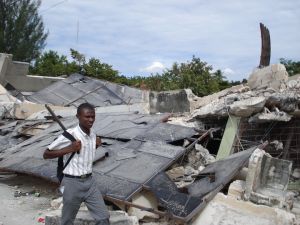10 Years After Haiti's Earthquake What Will Haitians In The U.S. On TPS Do?
10 Years Later: What Will Haitians On Temporary Protected Status In The U.S. Do Next?
Sunday marks the 10-year anniversary of the magnitude-7.0 earthquake of 2010 that forever changed the lives of Haiti and its’ residents. The lingering effects of the catastrophic natural disaster afforded safety and stability for refugees in the U.S. However, those living in America under temporary protected status are facing another reality 10 years later as those protections are due to expire next year. The Haitians who were evacuated to the U.S. under TPS now have an elevated sense of urgency to obtain naturalization in the states.
SEE MORE: What To Know About The Temporary Protection Status For Haitians In The U.S.
On Nov. 1, it was announced by the Department of Homeland Security that the protective status for Haiti, as well as the other countries affected by the earthquake, will be extended until Jan. 4, 2021. Prior to this extension, the status was due to expire in January and March of 2020, according to The Haitian Times.

Source: Haitian Times
Vania Andre, publisher of The Haitian Times, spoke with NewsOne about the uncertainty and fear that looms over the 50,000 Haitians that evacuated to the U.S., who now have to devise a plan as it pertains to their temporary status.
“I think the most important thing is to try to figure out how to get people to either become naturalized or find a way that they can help their relatives or their friends and family – find a way to have a permanent legal status here in the states,” Andre said.
She continued, “When you think about TPS and for the connection there – for me – it’s really first the T in TPS stands for ‘temporary.’ I don’t think that the goal should be one where we are looking to keep getting extensions. It really should be focused on how do we get people who have this status to get the natural permanent residency here – and what does that process look like. Part of that, that goes hand-in-hand, is really thinking about how to work with community partners on the ground to help get awareness campaigns out to the community.”
Andre noted that over the last few months, Haitian Americans have been trying to figure out the best way address the many political issues in Haiti while living in the U.S. Some are taking strides to become politically active in the states, which would possibly enable them to leverage power and influence “into how it could potentially help those in Haiti and the situation there.”
Others are riddled with fear about speaking up and becoming politically engaged due to the negative connotations that are typically aligned with immigration. Andre said there has to be a “hand-in-hand” partnership between Haitian-elected officials and those on protective status, as they are in positions to advocate for Haitians who are too afraid to voice their opinions.

Source: Haitian Times
While many Haitians are looking to gain natural permanent residency in the midst of their status expiring, there will also be many who will face deportation, despite Haiti’s current conditions being similar to when the earthquake first struck. The scope of the country’s recovery is a focal point of a trial being held in New York City that will ultimately determine if the Trump administration can end TPS for Haitians in the U.S., VOA News reports.
The trial focused on emails that were shared between U.S. officials regarding the living conditions in Haiti. In an email from Oct. 2017, Trump-appointed Kathy Kovarik of the Department of Homeland Security said, “The problem is that it reads as though we’d recommend an extension (of TPS) because we talk so much about how bad it is.”
Another official responded to Kovarik and said, “The basic problem is that it IS bad there. We can … try to get more, and/or comb through the country conditions we have again looking for positive gems, but the conditions are what they are.”
To that point, Andre said that although it has been 10 years since the earthquake hit, Haiti is still recovering immensely. The country is still dealing issues such as cholera, famine, and other deplorable conditions.
“To be frank, the country is still recovering from the earthquake,” she said. “And even though that seems preposterous because it’s 10 years after, it’s still not where it should be and bringing these people back there is not necessarily an option that people would see as the best one.”

Source: Haitian Times
Andre said that plans of action have to be constructed for both of the options that may present itself for Haitians in the U.S. – if they stay or if they have to leave. “On one breath, while I do say that the long-term goal has to be about thinking, how are we going to get these people permanent status here – legal status here? At the same time, it’s also understanding that there may very well be a situation where people do have to go back to Haiti. And even just thinking for those who are already there – who are there now – there has to be a way to think about where the country is at the moment,” she said.
Andre added that there is an interpersonal aspect of this situation that is often left out of the conversation.
“Thinking about mentally preparing yourself to understand that your life may look very different than it has for years prior,” she said. “Very little do we every really think about the emotional toll that it has on their day to day life. When you’re living with this burden of fear in your heart, it makes everything difficult.”
SEE ALSO:
Can’t Stop, Won’t Stop: Candidates Keep Stealing From Kamala Harris’ Campaign Playbook
Here’s How Immigrants Are Keeping The Spirit Of The Underground Railroad Alive
















